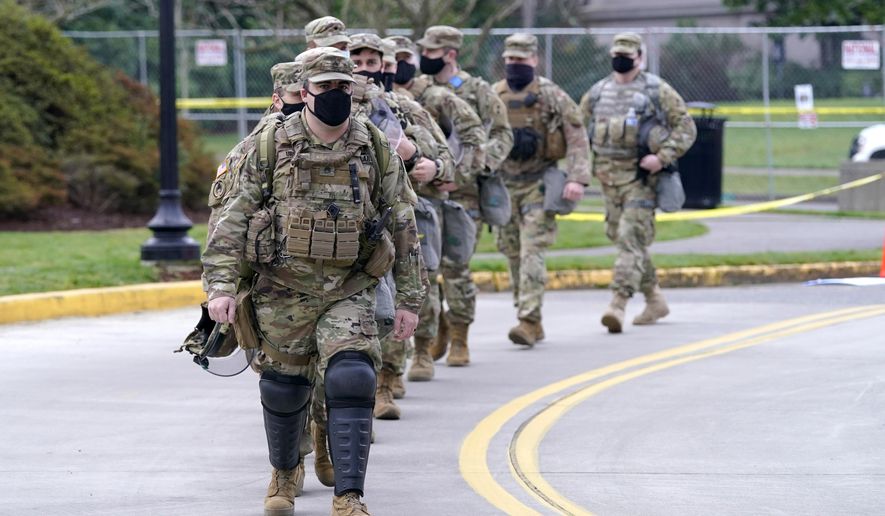Supporters of a bill to give the D.C. mayor control over the District’s National Guard force say they will continue to push for its inclusion in the National Defense Authorization Act (NDAA), although the provision wasn’t part of the bipartisan package of amendments that were accepted by the massive defense policy bill’s floor managers in the Senate.
The Senate was unable to reach an agreement on further amendment votes before leaving for Thanksgiving. Sen. Chris Van Hollen, Maryland Democrat, wants the chamber to pick up his District of Columbia National Guard Home Rule Act when senators come back into session next week, officials on Capitol Hill said.
The measure passed the Democratic-controlled House, but faces an uncertain future in the Senate. If it fails to be included, Mr. Van Hollen is expected to press colleagues in the House of Representatives to fight for the amendment when the legislation goes back to the conference to iron out difference between the two chambers’ bills.
The bill was approved by the House of Representatives in late September, the first time either chamber passed a bill to give the D.C. mayor control over the National Guard. It gave supporters hope the city’s elected leader could soon have the same authority as state governors over their Army and Air National Guard personnel.
Unlike with state National Guards, the president is the commander of the D.C. National Guard force as it protects the federal enclave. The anomaly caused tensions last year during the city’s occasionally violent Black Lives Matter protests and again in the response by local and federal security forces during the chaotic events at the Capitol Jan. 6.
Backers such as Del. Eleanor Holmes Norton, the District’s Democratic representative in the House, pointed to the January 6 storming of the U.S. Capitol by supporters of President Trump as an example of why the mayor should have control over the troops.
“The District of Columbia mayor is the chief executive for our jurisdiction and has the best knowledge and most reliable expertise about when to deploy our own National Guard,” she said in a statement.
Mr. Van Hollen said D.C. officials were left hamstrung as the mob stormed the U.S. Capitol because of the time it took for the National Guard’s deployment to be approved.
“It’s clear that the District must have complete authority over its National Guard to protect its own safety and security and that of our nation’s capital,” the Maryland Democrat said.
The D.C. National Guard has a unique command structure within the U.S. military. It was formed in 1802 specifically to defend the newly created District of Columbia. The commander is subordinate solely to the President of the United States. It’s the only guard unit out of 54 states and territories that reports only to the President.
The authority to activate the D.C. National Guard is delegated by the president through the secretary of defense to the Army and Air Force service secretaries. Supporters of the measure said a faster deployment of the Guard could have ended the Capitol confrontation hours earlier.
“As a former governor, I recall numerous instances in which I called on the Delaware National Guard to respond to emergency situations, such as floods, blizzards, ice storms, drought and more,” said Sen. Tom Carper, Delaware Democrat and a former governor of the state.
But Zack Smith, a legal fellow at The Heritage Foundation, said there is ample reason to proceed with caution before granting D.C.’s mayor command over the National Guard, given the city’s unique status.
“The Founders wanted to make sure they have the final say and ultimate control over exercising the safety and security of the federal district,” he said “Senators should proceed with caution before voting in favor.”
If stripped from authority over D.C. National Guard by law, a future president could be at loggerheads with the D.C. mayor.
“The D.C. mayor may not call out the National Guard to further the goal of the federal government,” Mr. Smith said.
Mr. Smith said D.C. might give home rule to the National Guard as a consolation prize for not being granted statehood. But Ms. Norton called the measure “another step toward granting full equality to D.C.”
The NDAA is the annual budget and policy bill that traditionally passed Congress with bipartisan support. The Senate is due to come back after the Thanksgiving break to begin floor debate on the measure.
• Mike Glenn can be reached at mglenn@washingtontimes.com.




Please read our comment policy before commenting.